小学英语语法 连词+介词
- 格式:doc
- 大小:94.50 KB
- 文档页数:8
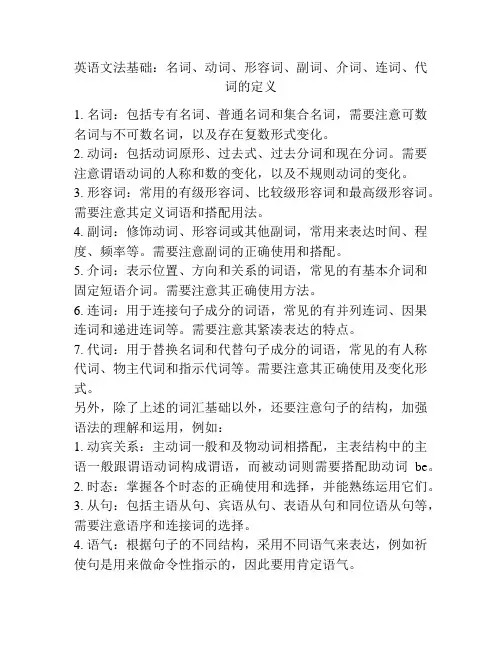
英语文法基础:名词、动词、形容词、副词、介词、连词、代
词的定义
1. 名词:包括专有名词、普通名词和集合名词,需要注意可数名词与不可数名词,以及存在复数形式变化。
2. 动词:包括动词原形、过去式、过去分词和现在分词。
需要注意谓语动词的人称和数的变化,以及不规则动词的变化。
3. 形容词:常用的有级形容词、比较级形容词和最高级形容词。
需要注意其定义词语和搭配用法。
4. 副词:修饰动词、形容词或其他副词,常用来表达时间、程度、频率等。
需要注意副词的正确使用和搭配。
5. 介词:表示位置、方向和关系的词语,常见的有基本介词和固定短语介词。
需要注意其正确使用方法。
6. 连词:用于连接句子成分的词语,常见的有并列连词、因果连词和递进连词等。
需要注意其紧凑表达的特点。
7. 代词:用于替换名词和代替句子成分的词语,常见的有人称代词、物主代词和指示代词等。
需要注意其正确使用及变化形式。
另外,除了上述的词汇基础以外,还要注意句子的结构,加强语法的理解和运用,例如:
1. 动宾关系:主动词一般和及物动词相搭配,主表结构中的主语一般跟谓语动词构成谓语,而被动词则需要搭配助动词be。
2. 时态:掌握各个时态的正确使用和选择,并能熟练运用它们。
3. 从句:包括主语从句、宾语从句、表语从句和同位语从句等,需要注意语序和连接词的选择。
4. 语气:根据句子的不同结构,采用不同语气来表达,例如祈使句是用来做命令性指示的,因此要用肯定语气。
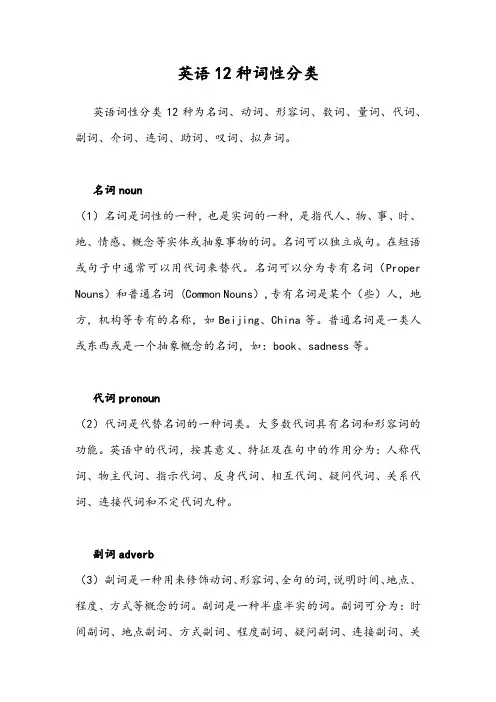
英语12种词性分类英语词性分类12种为名词、动词、形容词、数词、量词、代词、副词、介词、连词、助词、叹词、拟声词。
名词noun(1)名词是词性的一种,也是实词的一种,是指代人、物、事、时、地、情感、概念等实体或抽象事物的词。
名词可以独立成句。
在短语或句子中通常可以用代词来替代。
名词可以分为专有名词(Proper Nouns)和普通名词 (Common Nouns),专有名词是某个(些)人,地方,机构等专有的名称,如Beijing、China等。
普通名词是一类人或东西或是一个抽象概念的名词,如:book、sadness等。
代词pronoun(2)代词是代替名词的一种词类。
大多数代词具有名词和形容词的功能。
英语中的代词,按其意义、特征及在句中的作用分为:人称代词、物主代词、指示代词、反身代词、相互代词、疑问代词、关系代词、连接代词和不定代词九种。
副词adverb(3)副词是一种用来修饰动词、形容词、全句的词,说明时间、地点、程度、方式等概念的词。
副词是一种半虚半实的词。
副词可分为:时间副词、地点副词、方式副词、程度副词、疑问副词、连接副词、关系副词、频率副词和说明性副词等。
动词 verb(4)动词是表示动作、行为、心理活动或存在变化等的词。
例如:表示动作行为:走、坐、听、看、批评、宣传、保卫、学习、研究、进行、开始、停止、禁止。
介词 preposition(5)介词(preposition 简写prep.)又称作前置词,表示名词、代词等与句中其他词的关系,在句中不能单独作句子成分。
介词后面一般有名词、代词或相当于名词的其他词类、短语或从句作它的宾语,表示与其他成分的关系。
介词和它的宾语构成介词词组,在句中作状语,表语,补语,定语或介词宾语。
同时介词的用法也很灵活,同一个介词可以表达多种意义,介词可以分为时间介词、地点介词、方式介词、原因介词、数量介词和其他介词。
形容词 adjective(6)形容词是表示人和事物的形状、性质或表示动作、行为的性质状态的词。
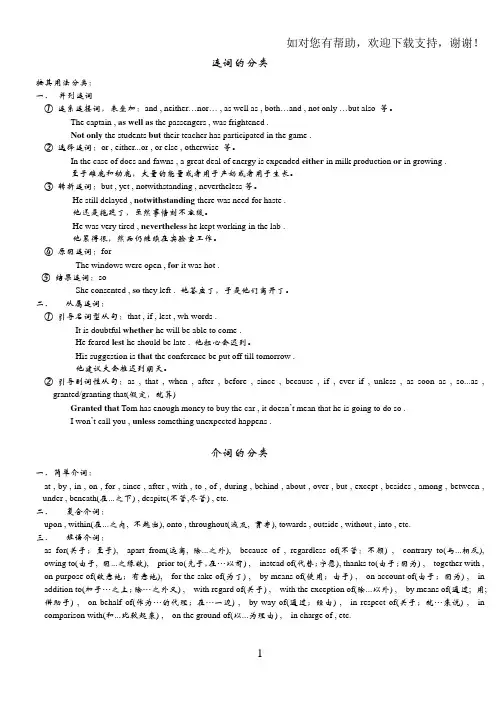
连词的分类按其用法分类:一、并列连词①连系连接词,表垒加:and , neither…nor… , as well as , both…and , not only …but also等。
The captain , as well as the passengers , was frightened .Not only the students but their teacher has participated in the game .②选择连词:or , either...or , or else , otherwise 等。
In the case of does and fawns , a great deal of energy is expended either in milk production or in growing .至于雌鹿和幼鹿,大量的能量或者用于产奶或者用于生长。
③转折连词:but , yet , notwithstanding , nevertheless等。
He still delayed , notwithstanding there was need for haste .他还是拖延了,虽然事情刻不容缓。
He was very tired , nevertheless he kept working in the lab .他累得很,然而仍继续在实验室工作。
④原因连词:forThe windows were open , for it was hot .⑤结果连词:soShe consented , so they left . 她答应了,于是他们离开了。
二、从属连词:①引导名词型从句:that , if , lest , wh-words .It is doubtful whether he will be able to come .He feared lest he should be late . 他担心会迟到。

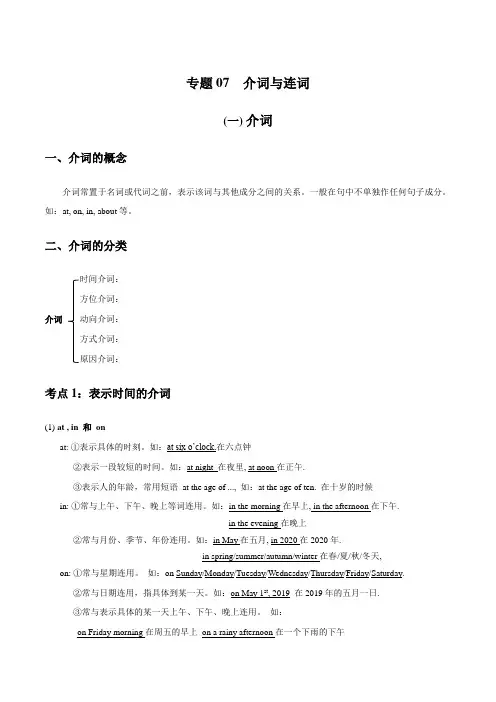
专题07 介词与连词(一)介词一、介词的概念介词常置于名词或代词之前,表示该词与其他成分之间的关系。
一般在句中不单独作任何句子成分。
如:at, on, in, about等。
二、介词的分类时间介词:方位介词:介词动向介词:方式介词:原因介词:考点1:表示时间的介词(1) at , in 和onat: ①表示具体的时刻。
如:at six o’clock.在六点钟②表示一段较短的时间。
如:at night 在夜里, at noon在正午.③表示人的年龄,常用短语at the age of ..., 如:at the age of ten. 在十岁的时候in: ①常与上午、下午、晚上等词连用。
如:in the morning在早上, in the afternoon在下午.in the evening在晚上②常与月份、季节、年份连用。
如:in May在五月, in 2020在2020年.in spring/summer/autumn/winter在春/夏/秋/冬天, on: ①常与星期连用。
如:on Sunday/Monday/Tuesday/Wednesday/Thursday/Friday/Saturday.②常与日期连用,指具体到某一天。
如:on May 1st, 2019 在2019年的五月一日.③常与表示具体的某一天上午、下午、晚上连用。
如:on Friday morning在周五的早上on a rainy afternoon在一个下雨的下午on the evening of May 5th在五月五日的晚上(2) before 和after 用来表示时间的先后顺序before:在……之前after:在……之后如:Spring comes before summer. 夏天之前是春天。
Come to my office after class. 放学后来我的办公室。
(3) from 用来表示从某段时间开始的动作,常与to 连用构成短语“from…to…”译为“从……到……”。
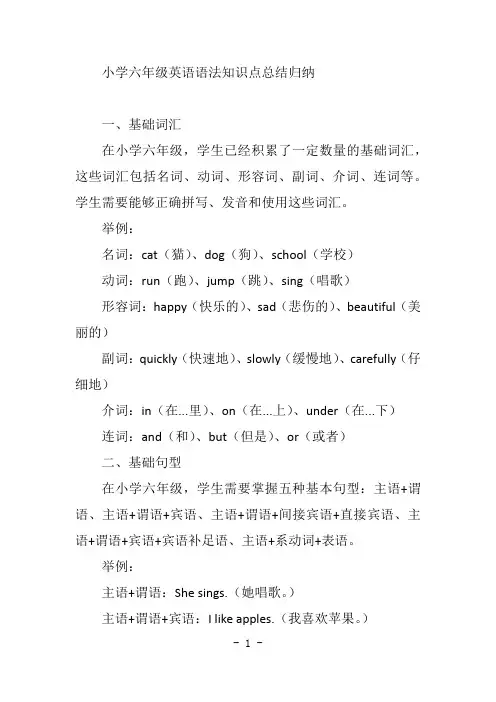
小学六年级英语语法知识点总结归纳一、基础词汇在小学六年级,学生已经积累了一定数量的基础词汇,这些词汇包括名词、动词、形容词、副词、介词、连词等。
学生需要能够正确拼写、发音和使用这些词汇。
举例:名词:cat(猫)、dog(狗)、school(学校)动词:run(跑)、jump(跳)、sing(唱歌)形容词:happy(快乐的)、sad(悲伤的)、beautiful(美丽的)副词:quickly(快速地)、slowly(缓慢地)、carefully(仔细地)介词:in(在...里)、on(在...上)、under(在...下)连词:and(和)、but(但是)、or(或者)二、基础句型在小学六年级,学生需要掌握五种基本句型:主语+谓语、主语+谓语+宾语、主语+谓语+间接宾语+直接宾语、主语+谓语+宾语+宾语补足语、主语+系动词+表语。
举例:主语+谓语:She sings.(她唱歌。
)主语+谓语+宾语:I like apples.(我喜欢苹果。
)主语+谓语+间接宾语+直接宾语:My mother gave me a book.(我妈妈给了我一本书。
)主语+谓语+宾语+宾语补足语:They elected him their monitor.(他们选他为班长。
)主语+系动词+表语:She is happy.(她很高兴。
)三、时态在小学六年级,学生需要掌握一般现在时、现在进行时、一般过去时和一般将来时这四种时态的基本用法。
举例:一般现在时:She always goes to school on time.(她总是按时上学。
)现在进行时:She is studying now.(她现在正在学习。
)一般过去时:Yesterday, we visited the zoo.(昨天,我们参观了动物园。
)一般将来时:I will go to the park tomorrow.(我明天将去公园。
)四、动词的基本形式学生需要了解动词的基本形式,包括原形、第三人称单数形式、现在分词、过去式和过去分词。
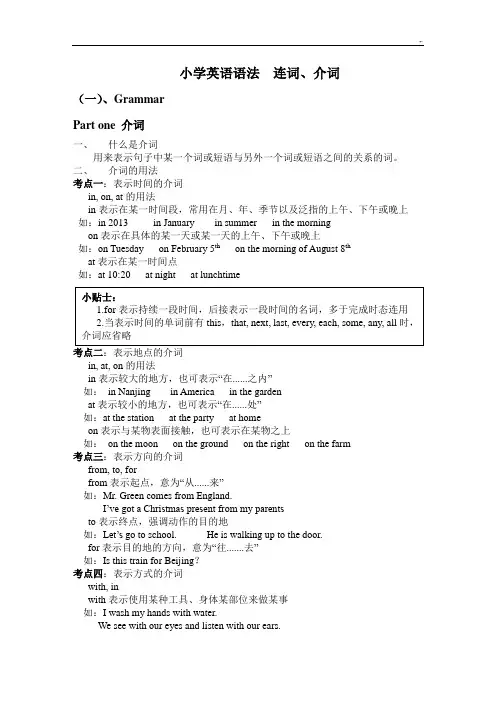
小学英语语法连词、介词(一)、GrammarPart one 介词一、什么是介词用来表示句子中某一个词或短语与另外一个词或短语之间的关系的词。
二、介词的用法考点一:表示时间的介词in, on, at的用法in表示在某一时间段,常用在月、年、季节以及泛指的上午、下午或晚上如:in 2013 in January in summer in the morningon表示在具体的某一天或某一天的上午、下午或晚上如:on Tuesday on February 5th on the morning of August 8that表示在某一时间点如:at 10:20 at night at lunchtime考点二:表示地点的介词in, at, on的用法in表示较大的地方,也可表示“在......之内”如:in Nanjing in America in the gardenat表示较小的地方,也可表示“在......处”如:at the station at the party at homeon表示与某物表面接触,也可表示在某物之上如:on the moon on the ground on the right on the farm考点三:表示方向的介词from, to, forfrom表示起点,意为“从......来”如:Mr. Green comes from England.I’ve got a Christmas present from my parentsto表示终点,强调动作的目的地如:Let’s go to school. He is walking up to the door.for表示目的地的方向,意为“往.......去”如:Is this train for Beijing?考点四:表示方式的介词with, inwith表示使用某种工具、身体某部位来做某事如:I wash my hands with water.We see with our eyes and listen with our ears.in表示使用某种语言如:Can you say it in English?一、填上合适的介词1. There is a supermarket _________ my house.2. Gao Shan is ______ duty today.3. Liu Tao often helps me ________ my study.4. My birthday is ________ October 21.5. There are lots of apples _______ the tree.6. I like reading and I can learn a lot ______ it.7. I can’t find the basketball. Maybe it’s ______ the door.8. I can buy some flowers _______ you.9. I get up ______ seven _______ the morning.10. Jack, please look _______ your things.二、根据中文提示,完成下列句子1. 墙上有许多标志。

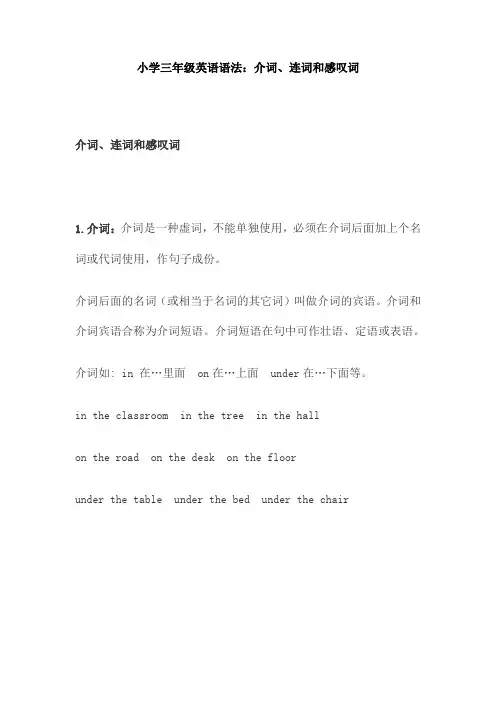
小学三年级英语语法:介词、连词和感叹词介词、连词和感叹词1.介词:介词是一种虚词,不能单独使用,必须在介词后面加上个名词或代词使用,作句子成份。
介词后面的名词(或相当于名词的其它词)叫做介词的宾语。
介词和介词宾语合称为介词短语。
介词短语在句中可作壮语、定语或表语。
介词如: in 在…里面on在…上面under在…下面等。
in the classroom in the tree in the hallon the road on the desk on the floorunder the table under the bed under the chair2.连词:连词是用来连接词与词、短语与短语、句子与句子等的词叫连词。
连词是一种虚词,在句子中不能单独作句子成分。
连词分两类:一类叫等立连词,另一类叫从属连词。
(1) 等立连词是用来连接同等的词、词组和分句的。
等立连词有许多,我们现在只学到了and和but,其他的以后学到再介绍。
如:A and B ; blue and white ;an apple and a banana; a car and a bus; Lucy and Ben ; Ben and Kitty ;This is a lorry and that's a drill.I like dolls and you like robots.(2) 从属连词是用来引起从句的、从属连词又分为引起名词性从句的连接词,如:if ,that 等。
引起壮语从句的连接词,如:when , after ,befare等。
以后会逐渐学到再介绍。
3.感叹词:表示说话人的某种感情(惊讶、高兴、痛苦等)的词叫感叹词。
感叹词后常用感叹号。
常用的感叹词有:oh(表示惊奇或痛苦),ah(表示惊奇或满意),hello(常被用来打招呼相当于汉语的“喂!”),well(表示惊讶,无奈)如:Hello.Are you Mary?练习:翻译下列词组1.在桌子上面2.在树下面3.在椅子上面4.在盒子里面5.在黑板上6.在书里7.在脸上8.在公共汽车上9.一只猫和一只狗. 10.又小又胖答案:1. on the desk2. under the tree3. on the desk4. in the box5. on the blackboard6. in the book7. on the face8. on the bus9. a cat and a dog 10. small and fat。
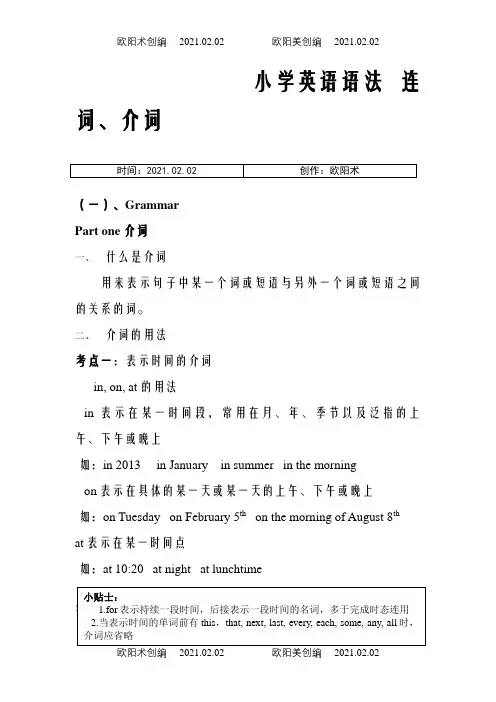
小学英语语法连词、介词(一)、GrammarPart one 介词一、什么是介词用来表示句子中某一个词或短语与另外一个词或短语之间的关系的词。
二、介词的用法考点一:表示时间的介词in, on, at的用法in表示在某一时间段,常用在月、年、季节以及泛指的上午、下午或晚上如:in 2013 in January in summer in the morningon表示在具体的某一天或某一天的上午、下午或晚上如:on Tuesday on February 5th on the morning of August 8that表示在某一时间点如:at 10:20 at night at lunchtimein, at, on的用法in表示较大的地方,也可表示“在......之内”如: in Nanjing in America in the gardenat表示较小的地方,也可表示“在......处”如:at the station at the party at homeon表示与某物表面接触,也可表示在某物之上如: on the moon on the ground on the right on the farm 考点三:表示方向的介词from, to, forfrom表示起点,意为“从......来”如:Mr. Green comes from England.I’ve got a Christmas present from my parentsto表示终点,强调动作的目的地如:Let’s go to school. He is walking up to the door.for表示目的地的方向,意为“往.......去”如:Is this train for Beijing?考点四:表示方式的介词with, inwith表示使用某种工具、身体某部位来做某事如:I wash my hands with water.We see with our eyes and listen with our ears.in表示使用某种语言如:Can you say it in English?一、填上合适的介词1. There is a supermarket _________ my house.2. Gao Shan is ______ duty today.3. Liu Tao often helps me ________ my study.4. My birthday is ________ October 21.5. There are lots of apples _______ the tree.6. I like reading and I can learn a lot ______ it.7. I can’t find the basketball. Maybe it’s ______ the door.8. I can buy some flowers _______ you.9. I get up ______ seven _______ the morning.10. Jack, please look _______ your things.二、根据中文提示,完成下列句子1. 墙上有许多标志。
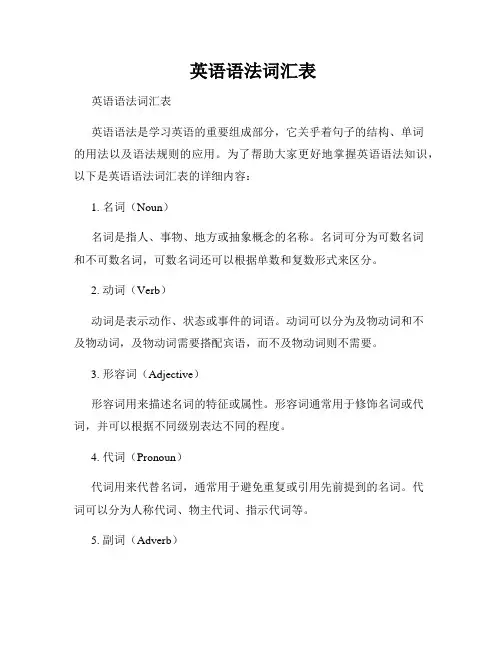
英语语法词汇表英语语法词汇表英语语法是学习英语的重要组成部分,它关乎着句子的结构、单词的用法以及语法规则的应用。
为了帮助大家更好地掌握英语语法知识,以下是英语语法词汇表的详细内容:1. 名词(Noun)名词是指人、事物、地方或抽象概念的名称。
名词可分为可数名词和不可数名词,可数名词还可以根据单数和复数形式来区分。
2. 动词(Verb)动词是表示动作、状态或事件的词语。
动词可以分为及物动词和不及物动词,及物动词需要搭配宾语,而不及物动词则不需要。
3. 形容词(Adjective)形容词用来描述名词的特征或属性。
形容词通常用于修饰名词或代词,并可以根据不同级别表达不同的程度。
4. 代词(Pronoun)代词用来代替名词,通常用于避免重复或引用先前提到的名词。
代词可以分为人称代词、物主代词、指示代词等。
5. 副词(Adverb)副词用来修饰动词、形容词或其他副词,表示时间、地点、方式、程度等。
副词通常以 -ly 结尾。
6. 介词(Preposition)介词用来表达名词或代词与其他词之间的关系,如时间、地点、方式、原因等。
介词通常位于名词或代词之前。
7. 连词(Conjunction)连词用来连接单词、短语或句子。
连词可以分为并列连词、从属连词和关联连词。
8. 冠词(Article)冠词用来限定名词的范围,分为定冠词(the)和不定冠词(a/an)。
9. 数词(Numeral)数词用来表示数字或数量,包括基数词和序数词。
10. 时态(Tense)时态是指动词的形式来表达不同时点的动作或状态,包括一般现在时、过去式、将来时等。
11. 语态(Voice)语态是指动词的形式来表示动作的执行者和承受者之间的关系,包括主动语态和被动语态。
12. 句子类型(Sentence Types)句子可以分为陈述句、疑问句、祈使句和感叹句等不同类型,它们在语法结构和使用方式上有所区别。
13. 主谓一致(Subject-Verb Agreement)主谓一致是指主语和谓语动词在人称和数上要保持一致,即单数主语对应单数谓语动词,复数主语对应复数谓语动词。
小学英语语法知识点大全总结归纳一、名词(Noun)名词是指人、事物、地点、概念等的名称。
它可以作为主语、宾语、定语等在句子中发挥重要作用。
1. 可数名词(Countable Noun):表示可以分为个体进行计数的名词,如dog(狗)、apple(苹果)。
2. 不可数名词(Uncountable Noun):表示不可以分为个体进行计数的名词,如water(水)、rice(米饭)。
3. 特殊名词(Proper Noun):指具体的人、地点、机构等特定的名称,如John(约翰)、London(伦敦)。
二、代词(Pronoun)代词用来代替名词,避免重复使用。
根据其在句子中所起的作用,可分为主格代词、宾格代词、形容词性物主代词、名词性物主代词、反身代词等。
1. 主格代词(Subject Pronoun):用来作为主语的代词,如I(我)、he(他)。
2. 宾格代词(Object Pronoun):用来作为宾语的代词,如me (我)、him(他)。
3. 形容词性物主代词(Possessive Adjective):用来修饰名词的所有权关系,如my(我的)、his(他的)。
4. 名词性物主代词(Possessive Pronoun):用来代替名词所属关系的代词,如mine(我的)、hers(她的)。
5. 反身代词(Reflexive Pronoun):用来表示动作反射到主体本身的代词,如myself(我自己)、himself(他自己)。
三、形容词(Adjective)形容词用来描述和修饰名词,使描述更加准确和生动。
1. 形容词的比较级形式(Comparative Form):用来比较两个事物的性质或程度,如taller(更高的)、more beautiful(更美丽的)。
2. 形容词的最高级形式(Superlative Form):用来比较三个或三个以上事物中的最高性质或程度,如tallest(最高的)、most beautiful (最美丽的)。
英语四年级语法
(最新版)
目录
1.英语四年级语法概述
2.四年级语法的主要内容
3.如何学习和掌握四年级语法
4.四年级语法的重要性
正文
【英语四年级语法概述】
英语四年级语法是针对小学生四年级学生的英语语法教育,主要包括时态、语态、情态动词、名词、代词、介词、连词等方面的知识。
这些知识点是英语学习的基础,对于培养学生的英语语言能力具有重要意义。
【四年级语法的主要内容】
1.时态:包括一般现在时、一般过去时、一般将来时、现在进行时、过去进行时、将来进行时等。
2.语态:包括主动语态和被动语态。
3.情态动词:如 can、may、must、should 等,用于表示可能性、允许、必须等。
4.名词:包括名词的单复数、名词所有格、名词的用法等。
5.代词:包括人称代词、物主代词、指示代词、疑问代词等。
6.介词:如 in、on、at、to 等,用于表示时间、地点、方向、对象等。
7.连词:如 and、but、or 等,用于连接词、词组或句子。
【如何学习和掌握四年级语法】
1.注重课堂学习,认真听讲,理解语法规则。
2.多做练习,通过实践巩固所学知识。
3.创设英语环境,多与同学、老师进行英语交流。
4.培养阅读习惯,多读英语文章,提高阅读能力。
5.及时复习,总结归纳,形成自己的知识体系。
【四年级语法的重要性】
1.语法是英语学习的基础,对于提高学生的英语语言能力具有重要意义。
2.掌握良好的语法,能够帮助学生更好地进行英语阅读、写作和口语表达。
3.对于培养学生的逻辑思维能力和语言组织能力具有积极作用。
小学生英语语法大全连词对于小学生来说,掌握英语语法是非常重要的一步,因为这可以帮助他们更好地理解英语语言的规则和结构。
在英语语法中,连词是用来连接词、短语或句子的词,它们可以帮助读者理解句子之间的关系。
and:这个词是最常见的连词之一,它用于连接两个或更多的词、短语或句子。
例如,“I like apple and banana.”(我喜欢苹果和香蕉。
)but:这个连词用于连接两个相反的词语或句子。
例如,“She is smart but lazy.”(她聪明但是懒惰。
)or:这个连词用于连接两个或更多的选择。
例如,“Do you want coffee or tea?”(你想喝咖啡还是茶?)because:这个连词用于解释原因和结果。
例如,“I am late because my alarm clock didn't work.”(我迟到了因为我的闹钟坏了。
)so:这个连词用于表示结果或结论。
例如,“It was raining so we stayed indoors.”(下雨了,所以我们呆在家里。
)除了以上这些常见的连词,还有一些其他的连词如“then”、“if”、“when”、“where”等等。
这些连词都是非常有用的,可以帮助读者更好地理解英语句子和文章。
在学习英语语法时,小学生应该学会识别和使用这些连词。
他们可以通过阅读课文、练习册和写作来练习使用这些连词。
家长和老师也可以通过解释和示范来帮助他们更好地理解这些连词的作用和用法。
名词:表示人或事物的名称。
例如:book(书)、class(班级)、teacher(老师)。
动词:表示动作或状态。
例如:run(跑)、love(爱)、study(学习)。
形容词:用来描述名词或代词的性质或状态。
例如:happy(高兴的)、beautiful(美丽的)。
副词:用来描述动词、形容词或其他副词的程度或方式。
例如:quickly (快速地)、very(非常)、happily(快乐地)。
小学英语三至五年级介词表什么是介词介词是连接词,常用来连接名词和名词、名词和动词、名词和形容词等,表示时间、地点、方式、原因、目的等。
常见介词- at 在……的时候或地点,例如:at home(在家里)、at school(在学校)、at night(在晚上)at在……的时候或地点,例如:at home(在家里)、at school(在学校)、at night(在晚上)- in 表示在……之内,例如:in the box(在盒子里)、in the room(在房间里)、in the morning(在早上)in表示在……之内,例如:in the box(在盒子里)、in the room(在房间里)、in the morning(在早上)- on 表示在……之上,例如:on the table(在桌子上)、on the bed(在床上)、on Sunday(在星期天)on表示在……之上,例如:on the table(在桌子上)、on the bed(在床上)、on Sunday(在星期天)- to 表示方向和目的地,例如:go to school(去学校)、give something to someone(把东西给某人)to表示方向和目的地,例如:go to school(去学校)、give something to someone(把东西给某人)- with 表示伴随,例如:play with friends(和朋友一起玩)、walk with a dog(和一只狗一起散步)with表示伴随,例如:play with friends(和朋友一起玩)、walk with a dog(和一只狗一起散步)- without 表示没有,例如:go without me(没有带我去)、eat without vegetables(没有吃蔬菜)without表示没有,例如:go without me(没有带我去)、eat without vegetables(没有吃蔬菜)- for 表示目的,例如:buy a gift for my mom(为我妈妈买礼物)for表示目的,例如:buy a gift for my mom(为我妈妈买礼物)- of 表示从属,例如:a picture of my family(一幅我家庭的照片)、the color of the sky(天空的颜色)of表示从属,例如:a picture of my family(一幅我家庭的照片)、the color of the sky(天空的颜色)希望这份介词表能够帮助到小学三至五年级的同学们。
一到六年级英语所有语法小学一到六年级的英语语法知识点较多,我将为您列举部分内容,如需全部内容,建议查阅小学英语教材和教辅。
一年级到二年级:1. 名词:学会用英语介绍日常生活中的常见事物,如动物、颜色、数字等。
2. 动词:了解基本动词,如“run”、“jump”、“play”等。
3. 形容词:初步了解形容词的概念,如“big”、“small”、“red”等。
4. 简单句:掌握基本的陈述句和疑问句,如“I am a student.”、“Are you a teacher?”等。
三年级到四年级:1. 名词:进一步学习名词的复数形式,如“boys”、“dogs”、“apples”等。
2. 动词:学习一般现在时,掌握动词的第三人称单数形式,如“he plays basketball.”、“she studies hard.”等。
3. 形容词:学习比较级和最高级,如“bigger”、“smallest”、“better”等。
4. 副词:初步了解副词的概念,如“quickly”、“slowly”、“happily”等。
5. 连词:学习常用连词,如“and”、“but”、“or”等。
6. 介词:学习常用介词,如“in”、“on”、“under”等。
7. 宾语从句:初步了解宾语从句的概念,如“I think that…”、“He said that…”等。
8. 祈使句:学习祈使句的用法,如“Please sit down.”、“Don’t touch the dog.”等。
9. 问句:学习特殊疑问句和一般疑问句的用法,如“What is your name?”、“Do you like apples?”等。
10. 感叹句:初步了解感叹句的概念,如“How beautiful the flower is!”等。
11. 并列句:学习并列句的用法,如“I like apples and bananas.”、“She is taller than me.”等。
小学英语语法连词、介词(一)、GrammarPart one 介词一、什么是介词用来表示句子中某一个词或短语与另外一个词或短语之间的关系的词。
二、介词的用法考点一:表示时间的介词in, on, at的用法in表示在某一时间段,常用在月、年、季节以及泛指的上午、下午或晚上如:in 2013 in January in summer in the morningon表示在具体的某一天或某一天的上午、下午或晚上如:on Tuesday on February 5th on the morning of August 8that表示在某一时间点如:at 10:20 at night at lunchtime考点二:表示地点的介词in, at, on的用法in表示较大的地方,也可表示“在......之内”如:in Nanjing in America in the gardenat表示较小的地方,也可表示“在......处”如:at the station at the party at homeon表示与某物表面接触,也可表示在某物之上如:on the moon on the ground on the right on the farm考点三:表示方向的介词from, to, forfrom表示起点,意为“从......来”如:Mr. Green comes from England.I’ve got a Christmas present from my parentsto表示终点,强调动作的目的地如:Let’s go to school. He is walking up to the door.for表示目的地的方向,意为“往.......去”如:Is this train for Beijing?考点四:表示方式的介词with, inwith表示使用某种工具、身体某部位来做某事如:I wash my hands with water.We see with our eyes and listen with our ears.in表示使用某种语言如:Can you say it in English?一、填上合适的介词1. There is a supermarket _________ my house.2. Gao Shan is ______ duty today.3. Liu Tao often helps me ________ my study.4. My birthday is ________ October 21.5. There are lots of apples _______ the tree.6. I like reading and I can learn a lot ______ it.7. I can’t find the basketball. Maybe it’s ______ the door.8. I can buy some flowers _______ you.9. I get up ______ seven _______ the morning.10. Jack, please look _______ your things.二、根据中文提示,完成下列句子1. 墙上有许多标志。
小学英语语法连词、介词(一)、GrammarPart one 介词一、什么是介词用来表示句子中某一个词或短语与另外一个词或短语之间的关系的词。
二、介词的用法考点一:表示时间的介词in, on, at的用法in表示在某一时间段,常用在月、年、季节以及泛指的上午、下午或晚上如:in 2013 in January in summer in the morningon表示在具体的某一天或某一天的上午、下午或晚上如:on Tuesday on February 5th on the morning of August 8that表示在某一时间点如:at 10:20 at night at lunchtime考点二:表示地点的介词in, at, on的用法in表示较大的地方,也可表示“在......之内”如:in Nanjing in America in the gardenat表示较小的地方,也可表示“在......处”如:at the station at the party at homeon表示与某物表面接触,也可表示在某物之上如:on the moon on the ground on the right on the farm考点三:表示方向的介词from, to, forfrom表示起点,意为“从......来”如:Mr. Green comes from England.I’ve got a Christmas present from my parentsto表示终点,强调动作的目的地如:Let’s go to school. He is walking up to the door.for表示目的地的方向,意为“往.......去”如:Is this train for Beijing?考点四:表示方式的介词with, inwith表示使用某种工具、身体某部位来做某事如:I wash my hands with water.We see with our eyes and listen with our ears.in表示使用某种语言如:Can you say it in English?一、填上合适的介词1. There is a supermarket _________ my house.2. Gao Shan is ______ duty today.3. Liu Tao often helps me ________ my study.4. My birthday is ________ October 21.5. There are lots of apples _______ the tree.6. I like reading and I can learn a lot ______ it.7. I can’t find the basketball. Maybe it’s ______ the door.8. I can buy some flowers _______ you.9. I get up ______ seven _______ the morning.10. Jack, please look _______ your things.二、根据中文提示,完成下列句子1. 墙上有许多标志。
There _________ a lot of __________ ___________ the wall.2. 你可以把我们学校的情况告诉他。
You can _________ him _________ our school.3. 他们正在谈论周末计划。
They are talking ________ their plans _________ the weekend.4. 南京夏天热吗?__________ it hot _____________ Nanjing ________ summer?5.你们能在邮局前面乘8路公交车。
You can ________ bus No. 8 ________ _______ ________ the post office. Part two连词一、什么是连词在句子中起连接作用,可以使词、短语或句子连接起来形成一定关系的词。
二、连词的用法考点一:并列连词(1)and:“和,并且”表示并列(2)both...and: “两者都......”表示连接(3)or: “或者,还是”表示选择(4)but: “但是”表示转折(5)not only... but also...: “不但......而且......”表示并列,但说话中心侧重后者考点二:从属连词(1)because: “因为”,表示原因,提问时用why一、用适当的连词完成下列句子1.He often helps them, ___________ he feels happy.2.You can watch it, _______ you can’t touch it.3.Which is bigger, this one _________ that one?4.Both my father ________ my mother are doctors.5.---Why are you absent today? ---________ I can’t catch the bus.6.Li Ming jumps farther _______ Liu Tao.二、同义句转换1.We should learn from books and we should learn from teachers.We should learn ___________from books __________ from teachers.2.Men will die without air and water.Men can’t live without air _____ water.3.Helen and Nancy were born in the same year.Helen is _________ _________ ________ Nancy.4.She was ill, so she wasn’t at school.__________ she was i ll, she wasn’t at school.一、单项选择( )1. I have got a present. It is _________ my mother.A. fromB. forC. toD. of( )2. Do you know the girl ______ red?A. inB. withC. ofD. to( )3. I can see many trees ________ the classroom.A. in front ofB. in the front ofC. in frontD. in the front ( )4. What’s wrong ________ you.A. forB. ofC. withD. in( )5. Hurry up. It’s time ______ class.A.inB. forC. ofD. to( )6. She stood up ________ went out.A. andB. orC. soD. but( )7. Who is right, Jacky ________ John?A. andB. butC. soD. or( )8. He is clever, ________ he is lazy.A. butB. andC. soD. or( )9. It is raining outside, _______ I have to stay at home.A. soB. andC. butD. or( )10. _______ my father _______ my mother are teachersA. Neither, orB. Both, andC. Either, orD. Not, but( )11. Be quick, _______ you’ll miss the train.A. butB. andC. orD. so二、用下面方框中的介词填空。
(可重复使用)Mr. Black is a very old man. Every morning he goes ______ a walk in the park. And he comes back ________ ten thirty for his lunch _______ the middle of the day. But today a car stops __________ his house at eleven o’clock. Two policemen helphim get __________. One of them says ______ Mr Black’s daughter, “The old man can’t find his way home in the park. He asks us to take him home ______ the car.”The daughter thanks the policemen _______ that. After they leave, she asks her father, “Dad, you go to the park every day. But today you can’t find the way. What’s wrong ______ you?” The old man smiles ______ a child and says, “Of course I can find my way home. But I don’t want to walk home, you know.”三、改错( )1. Both you and she has the same hobby. _____________A B C D( )2. Not only you but also Helen like collecting stamps. _____________A B C D( )3. Who jumps higher, Mike and David? _____________A B C D( )4. Because she was ill, so she was absent. _____________A B C D( )5. This present is as nicer as that one. _____________A B C D(二)语法知识拓展扩充连词的用法1. both …and 两者都She plays (both) the piano and the guitar.2.neither…nor 意思为"既不……也不……",谓语动词采用就近原则, 与nor后的词保持一致。